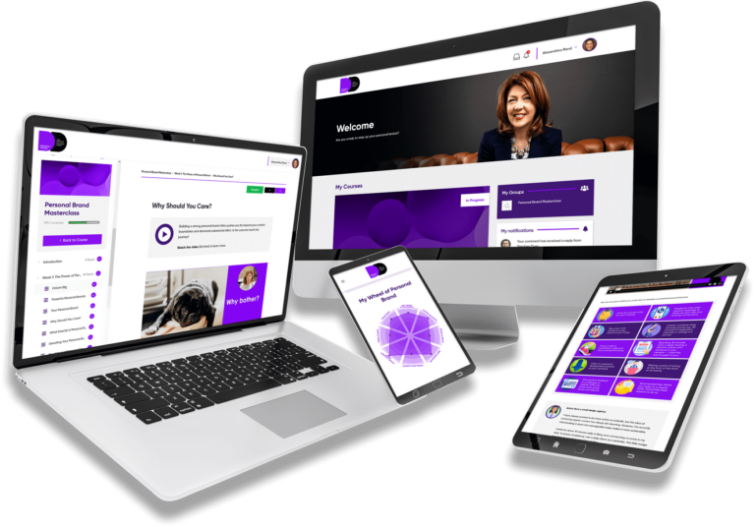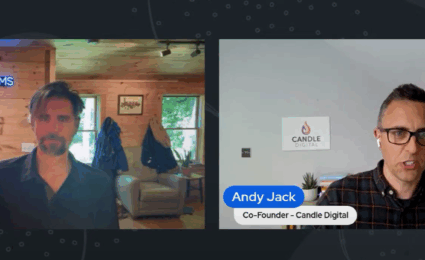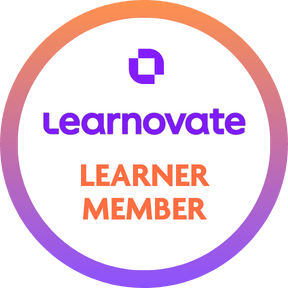Learning Technologies Award Showcase Event: Our Reflections

Last week we attended the eLearning Network’s annual Learning Technologies Award Showcase event in London. We’d previously enjoyed the ELN conference and the events held in Manchester (both excellent), but it’s the first time we’d made the trip down for this event.
The Award Showcase provides the chance to learn about some of the projects that are setting the benchmark. We were hoping to leave with some fresh ideas and some useful insights that we could adopt ourselves, and we certainly weren’t left wanting.
Here are some of the key themes we picked up on:
The importance of ‘advocates’ in encouraging adoption
It was noticeable that the initiatives with the most impact had used ambassadors to drive adoption amongst the intended audience. Gareth Britton’s excellent presentation on the John Lewis partner app (built to help their retail staff) highlighted how “champions” were chosen to help raise awareness, “extol the virtues” of the app and provide support across their teams when needed.
This was echoed in Stuart Ryan’s case study on Hilti, where community managers have been crucial in fostering an environment of participation. Hilti use Fuse, which from the slides seems to heavily orientate itself around user-generated content, which in turn can then be ranked and upvoted by the audience, so naturally involvement of the wider Hilti population is central to the success of this.
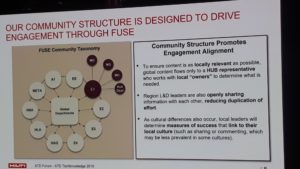
Hilti’s approach to community structure
Recently we’ve been thinking a lot about what L&D can learn from the field of marketing in terms of raising awareness, developing campaigns and instigating changes in behaviour and attitude. Both the Hilti and John Lewis examples chime well with this, and remind us of the thinking from Seth Godin, Richard Millington, Bianca Baumann. And of course, dancing guy comes to mind:
At Candle Digital we aim to encourage our clients to look at things more holistically – it’s not just about creating tools and resources that are useful, to be successful they have to be used. How we can help our clients encourage internal advocates within their audiences to drive usage is something we’ll be thinking a lot more about.
Artificial Intelligence is moving beyond the hype
The system developed by Speexx is nothing short of jaw-dropping. Armin Hopp’s introduction to the front and back-end of the platform – used to drive language ability improvements within organisations – demonstrated how learning platforms don’t have to be cumbersome to use and horrible to look at. Speexx was very much the opposite – the Ux was quite outstanding.
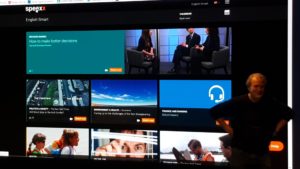
The Speexx interface
From our perspective, the most impressive thing about the system (serving approx 8.5 million students!) was that this was run by a team as small as five. While strong technical governance and a ruthless nature to functionality scope obviously contribute to this, speaker Armin Hopp was explicit that Artificial Intelligence (AI) plays a central role in helping Speexx keep operational headcount down, but also in serving up relevant, contextual nuggets to the learner.
AI has been talked about in learning technology circles for some time, but it now seems that with the likes of Filtered and Speexx, there’s actual some substance to this stuff and it’s starting to make a real difference. There’s huge opportunities in AI to power personalisation, curation and data analytics, and it seems like Speexx are taking full advantage. The dashboards in particular were a visual feast!

An example of a Speexx dashboard
User-centred design is central to strong impact
It was really pleasing to see user-centered practices playing such an integral part in the award winners. Then again it shouldn’t be surprising – asking difficult questions, involving the end user in all stages of development and making rapid iterations (rather than giant leaps) always tend to have better results, whatever the field.
We could see this in the move towards ‘performance support tools’ over ‘courses’. This is something we’ve seen with our own clients when unpicking how online tools can help people overcome challenges. Often it may not be a piece of online training that’s required – instead it could be something as simple as a checklist that could be the most effective solution.
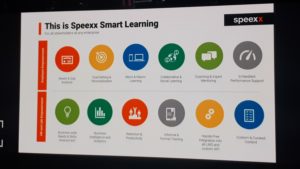
Speexx provides a range of different formats and experiences as part of their offering.
It was also apparent that there were key considerations around how the ‘solution’ would be accessed. For example the John Lewis solution was delivered through mobile, recognising that staff were “checking their phones anyway to find answers”. They also developed the app as a web app (rather than using native app functionality) – meaning that they can more easily react to changes and user feedback and tweak/add as necessary. Both of these decisions come from making the effort to ‘walk in the shoes’ of the end user, as well as considering what will make the initiative more sustainable in the long run.
For more information on ELN, take a look at their events calendar.
(As a final side note, what a venue the Aviva Digital Garage is!)
Fresh Insights Direct to Your Inbox
Enjoyed this article?
Join the Candle Digital Mailing List
You’ve Mastered Your Craft. Now Scale It.
